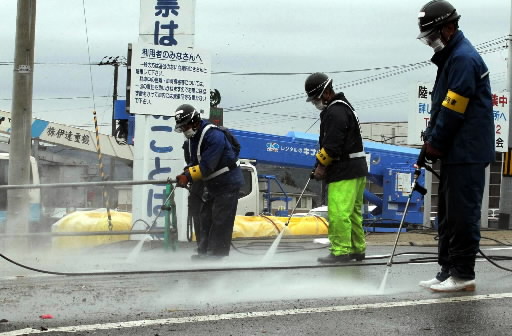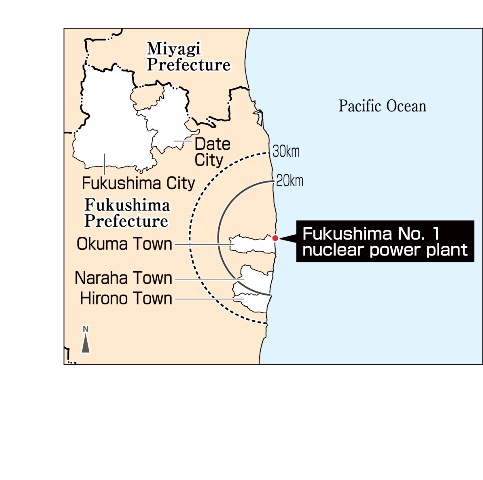From Hiroshima to Fukushima: Experience of A-bombed city must be used to benefit radiation-exposed region
Mar. 16, 2012
by Seiji Shitakubo, Staff Writer
One year has passed since the accident that struck the Fukushima No. 1 (Daiichi) nuclear power plant. The conditions that have occurred in Fukushima overlap the experiences of the A-bombed cities of Hiroshima and Nagasaki. People are fearful of the potential harm to their health from radiation. Such fears have given rise to damaging rumors and discrimination. The government has dragged its feet in providing assistance to the sufferers. Meanwhile, relief efforts from across the nation continue. In particular, the city of Hiroshima has been asked to offer information on the forms of support A-bomb survivors received, and did not receive, based on their experience. The city must now methodically examine its past and provide the benefit of its experience to the people of Fukushima.
The Japanese government has been moving forward with decontamination efforts in areas near the crippled power station, spending massively in the process. It has announced that, in April, the evacuation order for some local residents will be rescinded. Despite the fact that the effects of lingering radiation on the health of these residents is still uncertain, the government appears intent on having people return to their homes.
The town of Hirono in Fukushima Prefecture lies alongside the warning zone of 20 kilometers from the nuclear plant. Kazumasa Komatsu, 43, a civil servant of the town, has decided to return to his home alone, leaving the rest of his family behind at the place of their evacuation. Mr. Komatsu revealed his distress as he said, “I’m in the position of calling for our citizens to return, but I feel reluctant to do so when I think about the possible health effects on the members of my own family.”
A growing number of people in Fukushima have become more mindful of the A-bombed cities of Hiroshima and Nagasaki over the past year. This is tied to the fact that Fukushima residents now feel the conditions they face, with regard to the dangers of radiation, are similar to what the people of the A-bombed city experienced 67 years ago.
Initially, the central government dismissed, one after another, the applications for A-bomb disease certification that were filed by A-bomb survivors. However, the experience of the A-bomb survivors shows that the system of support for these sufferers developed incrementally alongside lengthy lawsuits and the demands they continued to voice. A gap remains, though, between the positions of the local people and the central government with respect to the black rain which fell in the immediate aftermath of the atomic bombing.
Last December, Prime Minister Yoshihiko Noda declared that the stricken reactors were now under control and that the nuclear disaster was at an end. The people of Fukushima, however, responded by bitterly rejecting Mr. Noda’s statement. Their faith in the government and the Tokyo Electric Power Company (TEPCO), which repeatedly manipulated information and concealed important data in the wake of the accident, has been deeply shaken. Since the accident, the Chugoku Shimbun has periodically spoken to Fukushima residents and produced a series of articles entitled “50 Residents of the Hamadori Region.” One year after the accident, these residents expressed distrust in the government and TEPCO.
TEPCO has been ordered to provide compensation for damages in Fukushima, but some problems cannot be solved with compensation alone.
In the city of Date, conditions are critical for area fruit orchards, an important industry in the region. One farmer was seen spraying the trunks of snow-covered persimmon trees with a high-pressure nozzle. Isao Sato, 63, was using the equipment to remove the tree bark, which had become contaminated with radioactive particles.
Because radiation can become concentrated in dried persimmons, the city’s farmers voluntarily banned the production of dried persimmons last year. Compensation, though, is expected for nearly the full amount of the loss the farmers suffered. “We will restart our production this year,” Mr. Sato said, but his voice lacked spirit.
“Even though our products clear the radiation standards set by the government, it’s hard to sell them as long as the negative image persists, Mr. Sato sighed, lamenting the fact that agricultural products from Fukushima are finding it difficult to attract buyers. Before the accident at the nuclear plant, Mr. Sato’s son-in-law had agreed to take over the farm, but the reality of such conditions have forced him to return to a career as a company employee. The vexing struggle of Fukushima, grappling with its exposure to radiation, continues.
“We’re studying the Atomic Bomb Survivors Relief Law, the challenges still unresolved and other factors, and we would like to see support measures for the people of Fukushima, too,” said Ayako Oga, 39, who lives in the town of Okuma near the crippled nuclear plant. She hopes the experiences of the A-bombed cities can be useful in administering this relief. Some residents from Fukushima visited the Hiroshima Prefectural Confederation of A-bomb Sufferers Organizations and learned about the implementation of such programs as the Atomic Bomb Survivor’s Certificate.
What were the steps that led to the successful enactment of the Atomic Bomb Survivors Relief Law and what are the challenges concerning the law that have yet to be resolved? Some provisions now recognize the effects that radiation has produced on the human body, but other aspects of the law still lack clarity. The A-bombed city of Hiroshima has achieved its recovery thanks to the humanitarian support provided by others in Japan and around the world. We now have a duty to examine our experiences of the past and make use of this experience for the benefit of those suffering from radiation exposure in Fukushima. It is a duty that must be promptly undertaken.
(Originally published on March 11, 2012)
One year has passed since the accident that struck the Fukushima No. 1 (Daiichi) nuclear power plant. The conditions that have occurred in Fukushima overlap the experiences of the A-bombed cities of Hiroshima and Nagasaki. People are fearful of the potential harm to their health from radiation. Such fears have given rise to damaging rumors and discrimination. The government has dragged its feet in providing assistance to the sufferers. Meanwhile, relief efforts from across the nation continue. In particular, the city of Hiroshima has been asked to offer information on the forms of support A-bomb survivors received, and did not receive, based on their experience. The city must now methodically examine its past and provide the benefit of its experience to the people of Fukushima.
Studying the achievements and challenges of the A-bomb relief law
The Japanese government has been moving forward with decontamination efforts in areas near the crippled power station, spending massively in the process. It has announced that, in April, the evacuation order for some local residents will be rescinded. Despite the fact that the effects of lingering radiation on the health of these residents is still uncertain, the government appears intent on having people return to their homes.
The town of Hirono in Fukushima Prefecture lies alongside the warning zone of 20 kilometers from the nuclear plant. Kazumasa Komatsu, 43, a civil servant of the town, has decided to return to his home alone, leaving the rest of his family behind at the place of their evacuation. Mr. Komatsu revealed his distress as he said, “I’m in the position of calling for our citizens to return, but I feel reluctant to do so when I think about the possible health effects on the members of my own family.”
A growing number of people in Fukushima have become more mindful of the A-bombed cities of Hiroshima and Nagasaki over the past year. This is tied to the fact that Fukushima residents now feel the conditions they face, with regard to the dangers of radiation, are similar to what the people of the A-bombed city experienced 67 years ago.
Initially, the central government dismissed, one after another, the applications for A-bomb disease certification that were filed by A-bomb survivors. However, the experience of the A-bomb survivors shows that the system of support for these sufferers developed incrementally alongside lengthy lawsuits and the demands they continued to voice. A gap remains, though, between the positions of the local people and the central government with respect to the black rain which fell in the immediate aftermath of the atomic bombing.
Rejecting the prime minster’s declaration
Last December, Prime Minister Yoshihiko Noda declared that the stricken reactors were now under control and that the nuclear disaster was at an end. The people of Fukushima, however, responded by bitterly rejecting Mr. Noda’s statement. Their faith in the government and the Tokyo Electric Power Company (TEPCO), which repeatedly manipulated information and concealed important data in the wake of the accident, has been deeply shaken. Since the accident, the Chugoku Shimbun has periodically spoken to Fukushima residents and produced a series of articles entitled “50 Residents of the Hamadori Region.” One year after the accident, these residents expressed distrust in the government and TEPCO.
TEPCO has been ordered to provide compensation for damages in Fukushima, but some problems cannot be solved with compensation alone.
In the city of Date, conditions are critical for area fruit orchards, an important industry in the region. One farmer was seen spraying the trunks of snow-covered persimmon trees with a high-pressure nozzle. Isao Sato, 63, was using the equipment to remove the tree bark, which had become contaminated with radioactive particles.
Because radiation can become concentrated in dried persimmons, the city’s farmers voluntarily banned the production of dried persimmons last year. Compensation, though, is expected for nearly the full amount of the loss the farmers suffered. “We will restart our production this year,” Mr. Sato said, but his voice lacked spirit.
Farmers struggle to sell agricultural products
“Even though our products clear the radiation standards set by the government, it’s hard to sell them as long as the negative image persists, Mr. Sato sighed, lamenting the fact that agricultural products from Fukushima are finding it difficult to attract buyers. Before the accident at the nuclear plant, Mr. Sato’s son-in-law had agreed to take over the farm, but the reality of such conditions have forced him to return to a career as a company employee. The vexing struggle of Fukushima, grappling with its exposure to radiation, continues.
“We’re studying the Atomic Bomb Survivors Relief Law, the challenges still unresolved and other factors, and we would like to see support measures for the people of Fukushima, too,” said Ayako Oga, 39, who lives in the town of Okuma near the crippled nuclear plant. She hopes the experiences of the A-bombed cities can be useful in administering this relief. Some residents from Fukushima visited the Hiroshima Prefectural Confederation of A-bomb Sufferers Organizations and learned about the implementation of such programs as the Atomic Bomb Survivor’s Certificate.
What were the steps that led to the successful enactment of the Atomic Bomb Survivors Relief Law and what are the challenges concerning the law that have yet to be resolved? Some provisions now recognize the effects that radiation has produced on the human body, but other aspects of the law still lack clarity. The A-bombed city of Hiroshima has achieved its recovery thanks to the humanitarian support provided by others in Japan and around the world. We now have a duty to examine our experiences of the past and make use of this experience for the benefit of those suffering from radiation exposure in Fukushima. It is a duty that must be promptly undertaken.
(Originally published on March 11, 2012)









